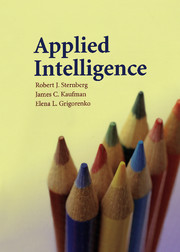Book contents
- Frontmatter
- Contents
- Preface
- 1 Views of Intelligence
- 2 The Theory of Successful Human Intelligence
- 3 Metacognition: Thinking with Metacomponents
- 4 Advanced Problem-Solving Steps
- 5 Cognitive Processing: Performance Components (I)
- 6 Cognitive Processing: Performance Components (II)
- 7 Logical Reasoning and Analysis of Arguments: Performance Components (III)
- 8 Inference and Inferential Fallacies
- 9 Knowledge-Acquisition Components
- 10 Coping with Novelty
- 11 Deciding for Creativity
- 12 Automatizing Information Processing
- 13 Practical Intelligence
- 14 Why Intelligent People Fail (Too Often)
- References
- Author Index
- Subject Index
7 - Logical Reasoning and Analysis of Arguments: Performance Components (III)
Published online by Cambridge University Press: 09 November 2009
- Frontmatter
- Contents
- Preface
- 1 Views of Intelligence
- 2 The Theory of Successful Human Intelligence
- 3 Metacognition: Thinking with Metacomponents
- 4 Advanced Problem-Solving Steps
- 5 Cognitive Processing: Performance Components (I)
- 6 Cognitive Processing: Performance Components (II)
- 7 Logical Reasoning and Analysis of Arguments: Performance Components (III)
- 8 Inference and Inferential Fallacies
- 9 Knowledge-Acquisition Components
- 10 Coping with Novelty
- 11 Deciding for Creativity
- 12 Automatizing Information Processing
- 13 Practical Intelligence
- 14 Why Intelligent People Fail (Too Often)
- References
- Author Index
- Subject Index
Summary
WHAT IS LOGICAL REASONING?
Suppose that four friends – Mike, Zoe, Ira, and Kate – are having a conversation about the death penalty. Zoe says, “I think the death penalty is wrong.” Zoe is making a claim. A claim is a statement asserting a particular characteristic, quality, or property of something or someone and is subject to dispute. In other words, claims can be supported or undermined and may be false or true. Claims are inferential beliefs derived from other statements.
Claims form the basis of everyday conversations, public dispute, mass media, and scientific debates. But how do we determine whether these claims are true? To return to the example, how would Mike decide whether Zoe's claim, that the death penalty is wrong, is true or false?
Mike could consider the majority opinion on the issue. Often claims are evaluated based on whether there is a consensus (or a general agreement) of opinions on the matter. For example, imagine if Mike lived in Texas, the U.S. state with the highest number of executions performed since 1982. Then he might argue that, in his state, legislators have reached a consensus that is the opposite of Zoe's claim. Ira, on the other hand, might sustain Zoe's argument by appealing to facts (events that are taken as actual and not likely to change).
- Type
- Chapter
- Information
- Applied Intelligence , pp. 189 - 203Publisher: Cambridge University PressPrint publication year: 2008



